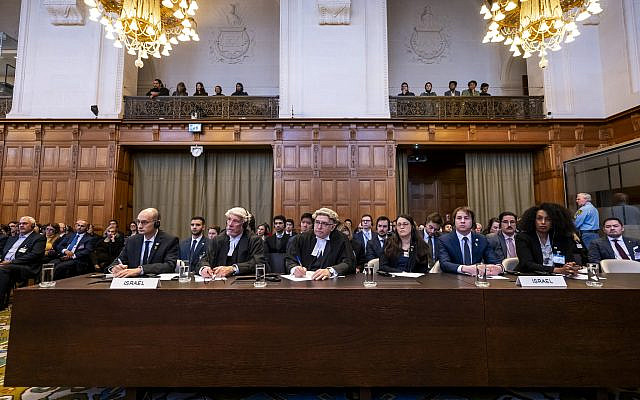Cutting arms exports: A new horizon in lawfare against Israel

Should Israel be entitled to arm itself militarily to sustain its fight against Hamas? A new trend has emerged in recent weeks, starting with Itochu Corporation’s decision in early February 2024, to cease its collaboration with Israeli defense company Elbit Systems. Additionally, the Walloon Parliament in Belgium, on February 5, 2024, opted to suspend licenses for gunpowder exports to Israel.
These decisions stem from concerns regarding the legality of Israel’s actions against Hamas, particularly in light of the International Court of Justice, in the South Africa v. Israel case. The ICJ granted provisional measures, compelling Israel to ensure it fulfills its obligations under the Genocide Convention in its war against terrorism.
Following these events, the Hague Court of Appeals directed the Dutch government, on February 12, 2024, to cease the export of F-35 parts to Israel. And Nicaragua initiated new proceedings at the International Court of Justice on March 1, 2024, alleging that Germany’s assistance to Israel violated its obligations under the Genocide Convention. These moves are grounded in common Article 1 of the Geneva Conventions, which mandates states “to respect and to ensure respect” and uphold international humanitarian law, thus promoting adherence and accountability.
These developments mark the onset of a legal trend that could potentially culminate in an international push for restrictions or even a comprehensive embargo on arms exports to Israel. Such recourse to the Geneva Conventions is often termed “lawfare”, wherein the law is strategically leveraged to compel states to act in specific ways or refrain from certain actions. Lawfare is subject to criticism, particularly when non-state actors or proxies utilize legal means, creating a scenario where one party such as Israel, is constrained by international law while the opposing side, in this instance Hamas, can flout international law while exploiting it to constrain its adversary.
There are two additional problematic aspects to the current developments. First, the factual evaluation by the Hague Court is based solely on circumstantial evidence, despite the real-world implications of its rulings. This could potentially affect trade relations between Israel and the Netherlands on a broader scale, impacting the Netherlands’ participation in multilateral supply chains. It’s worth mentioning that just last year, Israel and the Netherlands finalized a $305 million export agreement for artillery rocket systems from Elbit.
Second, both the Hague ruling and Nicaragua’s application refrained from presenting any evidence establishing a causal link between the export and an alleged violation. This low evidentiary standard could potentially embolden efforts to impose an arms embargo based solely on alleged violations of the laws of war, rather than requiring conclusive proof of illegality. Significantly, there has already been pressure to halt the supply of arms to Israel in countries such as France, Spain and the United Kingdom, with recent reports indicating that Canada will cease its future arms exports to Israel.
In contrast, previous invocations of common Article 1 of the Geneva Conventions typically involved documented breaches of international law during well-documented conflicts, resulting in severe consequences. Examples include Sudan in 2008, Libya in 2011 and Syria in 2012. Each of those cases either involved domestic conflicts where civilians were left vulnerable to their own government’s actions, or conflicts where non-state groups endangered civilians in the absence of a functioning rule of law.
This situation contrasts significantly with the Israel-Hamas war, where Israel is asserting its inherent right of self-defense against the worst terrorist attack on its territory since its establishment – the October 7 massacre. The attack resulted in the deaths of more than 1,200 individuals including children, women and the elderly, with 240 people abducted. That attack employed extreme methods of violence, some of which were documented by the perpetrators themselves and shared on social media platforms. These actions themselves represent serious violations of international humanitarian law.
There is a delicate balance between the imperative to uphold international humanitarian law through legal recourse and the risk of misusing legal mechanisms to hinder a state’s ability to defend itself, particularly in response to horrific events like the October 7 massacre. The International Committee of the Red Cross has noted that common Article 1 of the Geneva Conventions is a dynamic instrument, suggesting the need for further specification and practical application. Therefore, it falls upon states to lead efforts in defining the requisite level of evidence needed to invoke this provision for limiting military export or other forms of assistance. However, a cautious and judicious approach is warranted to prevent the abuse of legal avenues.
In navigating the complex intersection of law, security, and humanitarian concerns, the path must be guided by both the principles of justice and the imperative of safeguarding lives, ensuring that legal actions serve to uphold the dignity of all affected parties while guarding against violations of law.

